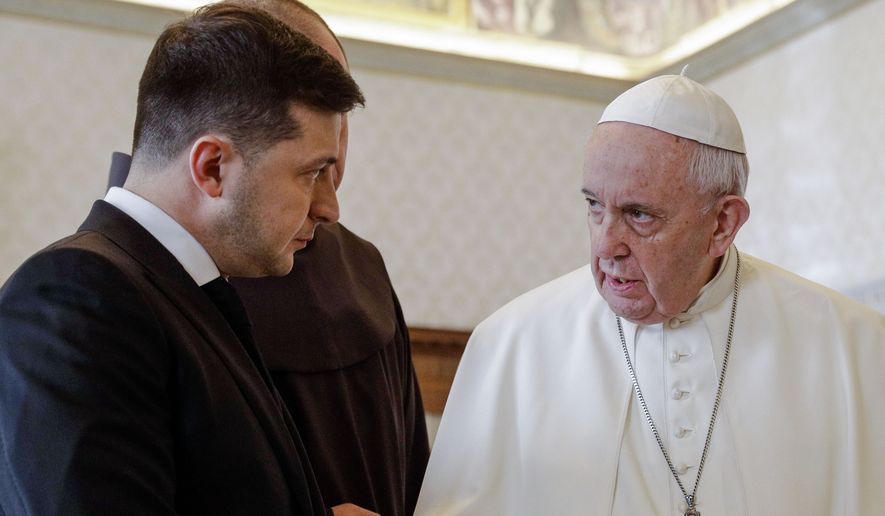OPINION:
On March 25, the Solemnity of the Annunciation, Pope Francis will lead an Act of Consecration of Russia and Ukraine to the Immaculate Heart of Mary.
In a letter to Catholic bishops, Pope Francis wrote, “This Act of Consecration is meant to be a gesture of the universal Church, which in this dramatic moment lifts up to God, through His Mother and ours, the cry of pain of all those who suffer and implore an end to the violence, and to entrust the future of our human family to the Queen of Peace.”
For Catholics, the act of consecration has important spiritual as well as historical significance. According to the Vatican’s Congregation for Divine Worship, consecration to Mary is defined as recognizing “the singular role of Mary in the Mystery of Christ and of the Church, of the universal and exemplary importance of her witness to the Gospel, of trust in her intercession, and of the efficacy of her patronage.”
In short, consecration sets something apart for a holy purpose. When making an act of consecration to the Blessed Virgin Mary, as Saint John Paul II described, it “means accepting her help to offer ourselves and the whole of mankind to him who is holy, infinitely holy.”
Although the practice of consecration to Mary dates back to the early centuries of Christianity, its modern significance is rooted in the apparitions of Our Lady at Fatima in the early 20th century.
In 1917, three Portuguese children, Saint Francisco Marto, Saint Jacinta Marto, and Lucia dos Santos, received visions of the Blessed Virgin Mary on the 13th day of each month from May through October. Through these apparitions, Mary revealed to the children a series of messages about the state of the world, evil, and God’s promise for peace. Three of the messages conveyed to the children at Fatima became known as “secrets” as they were not made public for decades.
In her 1941 memoir, Sister Lucia recalled the Blessed Virgin Mary telling her and the other children, “I shall come to ask for the consecration of Russia to my Immaculate Heart, and the Communion of reparation on the First Saturdays. If my requests are heeded, Russia will be converted, and there will be peace; if not, she will spread her errors throughout the world, causing wars and persecutions of the Church. The good will be martyred; the Holy Father will have much to suffer; various nations will be annihilated. In the end, my Immaculate Heart will triumph. The Holy Father will consecrate Russia to me, and she shall be converted, and a period of peace will be granted to the world.”
Since the apparitions at Fatima, Russia and the whole world have been consecrated to the Immaculate Heart of Mary on numerous occasions and by several popes. In 1942, Pope Pius XII consecrated the whole world, and in 1952, he consecrated the people of Russia. Again in 1964, Saint Paul VI renewed the consecration of Russia.
In 1981, Saint John Paul II composed and celebrated a prayer he called an “Act of Entrustment” for the whole world. Then on March 25, 1984, Saint John Paul II drew upon this Act of Entrustment and solemnly and universally consecrated all people to the Immaculate Heart of Mary. According to the Vatican, Sister Lucia personally confirmed in a letter in 1989 that this 1984 consecration fulfilled the Blessed Mother’s request.
On April 27, 2000, at the request of Saint John Paul II, Sister Lucia met with Archbishop Tarcisio Bertone to discuss her interpretations of the apparitions at Fatima. According to the Vatican’s summary of the conversation, Sister Lucia, “repeated her conviction that the vision of Fatima concerns above all the struggle of atheistic Communism against the Church and against Christians, and describes the terrible sufferings of the victims of the faith in the twentieth century.”
Today, amidst the horrific devastation of Russia’s invasion and the onset of the War on Ukraine – which has already forced 10 million Ukrainians from their homes, and more than 3.5 million refugees from their country – Pope Francis is asking the world to join him in asking Mary, the Queen of Peace, for her intercession.
As Major Archbishop Sviatoslav Shevchuk, the head of the Ukrainian Greek Catholic Church, said, “This is a spiritual act long-awaited by the people of Ukraine. Since the beginning of Russian aggression in 2014, Ukrainian Catholics have been urgently requesting this Act to prevent the worsening of the war and the dangers coming from Russia.”
As war continues to ravage Ukraine, may we join Pope Francis in prayer for peace in Ukraine and around the world.
- For more commentary from Ambassador Gingrich, visit Gingrich360.com.




Please read our comment policy before commenting.